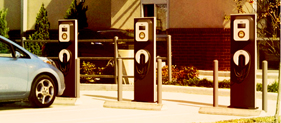Researchers Say Charging Stations Remain Key To Electric Cars
 An Idaho National Laboratory study has found that widespread adoption of electric vehicles could reduce the country's gas consumption, but that the availability of charging stations determines whether more people buy. The report looks at research from 2011 through 2013 and is the most comprehensive study of electric vehicles and charging usage ever conducted. The research was conducted for the U.S. Department of Energy, which is pushing for more widespread adoption of plug-in electric cars.
An Idaho National Laboratory study has found that widespread adoption of electric vehicles could reduce the country's gas consumption, but that the availability of charging stations determines whether more people buy. The report looks at research from 2011 through 2013 and is the most comprehensive study of electric vehicles and charging usage ever conducted. The research was conducted for the U.S. Department of Energy, which is pushing for more widespread adoption of plug-in electric cars.
Researchers collected data from thousands of charging stations. They also collected data from electric vehicles in car-sharing fleets in 22 cities. It has been long known that a slow-growing infrastructure holds back the widespread adoption of electric vehicles. Yet, the report suggests that it is a dominant sticking point as well, perhaps more significant than the relatively low cost of gasoline currently.
The report found that charging stations should be in places where vehicles spend long periods parked, including homes and workplaces, as opposed to where gas stations are. It also found that home charging stations could be made more efficient and cost effective, such as having owners charge during off-peak hours.
The report found that 85 percent of charging took place at drivers' homes, with charging primarily taking place at workplaces otherwise.
Chevy Volt drivers tend to drive more electric-powered miles in a year on average than Nissan Leaf drivers, despite having less battery capacity. Researchers said this is in part because the Volt has a traditional backup engine, allowing drivers to feel more confident running down their battery.
 An Idaho National Laboratory study has found that widespread adoption of electric vehicles could reduce the country's gas consumption, but that the availability of charging stations determines whether more people buy. The report looks at research from 2011 through 2013 and is the most comprehensive study of electric vehicles and charging usage ever conducted. The research was conducted for the U.S. Department of Energy, which is pushing for more widespread adoption of plug-in electric cars.
An Idaho National Laboratory study has found that widespread adoption of electric vehicles could reduce the country's gas consumption, but that the availability of charging stations determines whether more people buy. The report looks at research from 2011 through 2013 and is the most comprehensive study of electric vehicles and charging usage ever conducted. The research was conducted for the U.S. Department of Energy, which is pushing for more widespread adoption of plug-in electric cars.